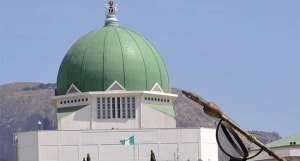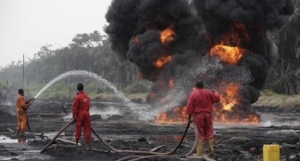National Assembly Summons Buhari Over Nigeria’s Recession
 The National Assembly has passed a resolution inviting President Muhammadu Buhari to brief a joint session of the legislators on the state of Nigeria’s economy.
The National Assembly has passed a resolution inviting President Muhammadu Buhari to brief a joint session of the legislators on the state of Nigeria’s economy.
Lawmakers in the Senate at Thursday’s legislative proceedings unanimously concurred with the resolution of the House of Representatives.
They asked President Buhari to hold an emergency joint session with the aim of providing information on what his administration was doing to get Nigeria out of the recession.
The decision followed a motion raised by the Deputy Senate Leader, Senator Bala Ibn Na’allah, which drew the attention of the Senate to the resolution from the lower chamber.
 The House of Representatives had said it was imperative that the President address a joint session of the National Assembly to outline plans to pull Nigeria out of recession.
The House of Representatives had said it was imperative that the President address a joint session of the National Assembly to outline plans to pull Nigeria out of recession.
The lawmakers reached the resolution after a debate that spanned two days at the floor of the lower chamber in Abuja.
To indicate how important the situation was, the Minority Leader of the House, Toby Okechukwu as well as some other lawmakers, Leo Ogor and Oluwole Oke, outlined the factors they believed led to the recession.
Most of them identified the Treasury Single Account Policy, Foreign Exchange Policy and the structure of Nigeria as some of the issues that needed to be addressed.
Economy In Recession
Nigerians have lamented the upsurge in the cost of commodities, one of which is rice from 12,000 Naira to over 20,000 Naira in some parts of the country, a fall out of the economic recession.
Economic analysts had predicted more persons going into smuggling of rice due to the increase in price, with most of them opting for Benin Republic where they could get rice for as low as 12,000 Naira.
While the government is making effort to address the economic challenges, a World Economic Outlook report released by the International Monetary Fund predicted that the Nigerian economy would grow by 0.6% in 2017.
The report revealed that the nation’s real Gross Domestic Product was expected to increase marginally by 0.6% with Consumer Prices rising by 17.1%, effectively lifting the country out of an officially declared recession.
Attacks On Oil Facilities
The recession was a result of the drop in the price of crude oil and the attacks on the nation’s oil facilities by some militant groups in the Niger Delta region.

Some militants under the umbrella of the Niger Delta Avengers have claimed responsibility for most of the attacks which have drawn the attention of the Nigerian Government and some other foreign governments.
Disturbed by the spate of the militants’ activities, the Nigerian Army launched a special team code-named “Operation Crocodile Smile”, as the government agreed to dialogue with the militants after a ceasefire agreement from both sides.
In spite of the development, both military and militants have continued to point accusing fingers, alleging a breach of agreements as the military said it would not hesitate to repel militants’ attack in the region.
No comments:
Post a Comment